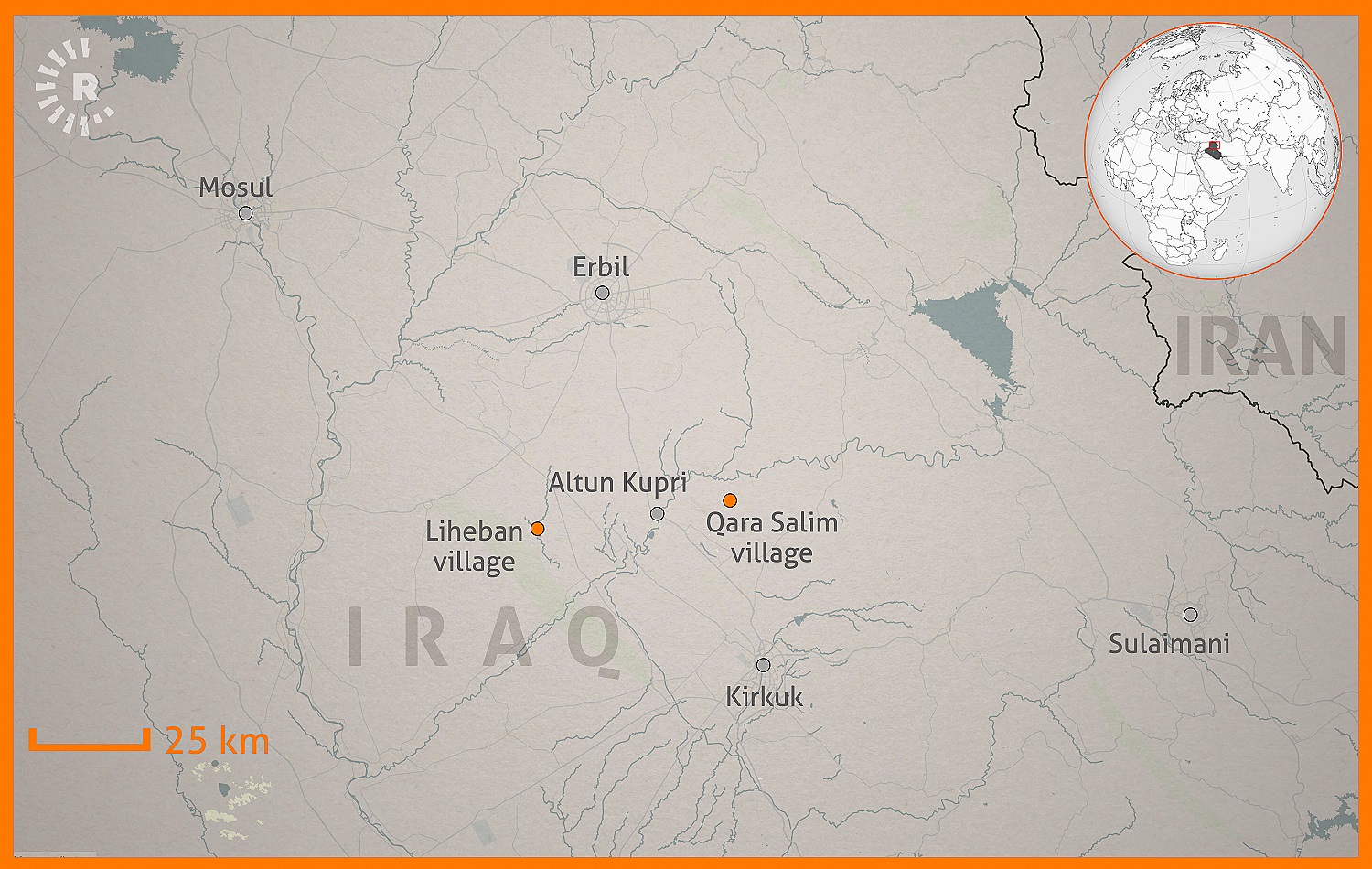ERBIL, Kurdistan Region - Islamic State (ISIS) militants attacked Kurdish Peshmerga fighters for the second time this month in Kirkuk province late on Sunday, resulting in deaths and injuries, the Peshmerga ministry said in a statement released in the early hours on Monday morning, with later confirmation that four Peshmerga were killed in the attack.
ISIS attacked a Peshmerga checkpoint near the village of Qara Salim close to the town of Pirde on Sunday, as the nearby village of Liheban, located near Mount Qarachogh in Makhmour, was also taken over by ISIS after villagers attempted to fight back their attackers.
A statement published by the Ministry of Peshmerga said there were “martyrs and injuries from the Peshmerga forces,” with an official source subsequently confirming on Monday that there were four fatalities.
Jabbar Yawar, Secretary-General of the Ministry of Peshmerga said Kurdish and Iraqi forces told Rudaw on Sunday that the Peshmerga needed “to change our fighting tactics with ISIS terrorists, because they are now fighting a partisan war, and we are defending.”
Three civilians and 18 Peshmerga fighters have been killed in attacks conducted since November 27 by ISIS militants in areas disputed by Erbil and Baghdad, as the group has mounted increased assaults on Kurdish forces in these areas.
Eight Kurdish soldiers were killed in an attack in Diyala province on November 29. Another ten and three civilians were killed when the terror group attacked the two villages of Liheban and Khidirjija in Erbil’s Makhmour town on Thursday.
Villagers from Liheban said they initially fought off ISIS' attack during the day, but the village was ultimately taken by the group on Sunday evening with all residents forced to evacuate their homes.

“We have evacuated the village. We evacuated it this evening. Daesh [Arabic acronym for ISIS] is in our village now,” Ayub Abdullah, a villager from Liheban told Rudaw on Monday.
Abdullah explained how they were told to leave in the evening, not saying from whom the instruction came. “This evening there was no shooting, we evacuated the village. The sun hadn’t set when we were told that they were coming towards the village… God knows I fought until dawn yesterday.”
Abdullah said that his village was now calling on the Kurdistan Regional Government (KRG) for support. “Our village will be evacuated and will be a hub for Daesh. Now Daesh is across from me, in my village. My heart aches,” he added.
Liheban and six other villages in this area are located within territories claimed by both the Iraqi and Kurdish governments. There is a gap between the forces of the two governments, leaving villagers to fend for themselves against ISIS militants who take advantage of the security vacuum.
Villagers from the area spoke to Rudaw about their suffering in November, explaining how families keep watch over their houses at night and, during the day, farmers keep their guns closeby in case they need to defend themselves.
Peshmerga Minister Shorsh Ismail, from the village of Khidirjija, told Rudaw while visiting families of the martyred Peshmerga on Sunday that the Iraqi forces and government had been “careless.”
“Since threats of Daesh have recently increased, Iraq has approached [us, to discuss closer cooperation], we hope that this approach and readiness of Iraq is not temporary because the fight against Daesh needs continuous efforts,” added Ismail.
ISIS seized control of swaths of land in Iraq in 2014. It was declared territorially defeated in 2017 but continues to carry out bombings, hit-and-run attacks, and abductions across several provinces. It is especially active in parts of northern Iraq that are disputed by Erbil and Baghdad, including in the provinces of Kirkuk, Diyala, Salahaddin, and Makhmour.
Major General Abdulkhaliq Talaat, the Kurdistan Region representative for the Joint Operations Command, told Rudaw on Sunday that joint forces of Kurdish and Iraqi forces should be formed to protect the disputed territories, adding that fighter forces of the coalition are not going to intervene as was agreed upon with Iraq, but will participate with surveillance and fighter jets.
Iraqi Prime Minister Mustafa al-Kadhimi and President Barham Salih condemned last week’s ISIS attack on civilians and Peshmerga forces in Makhmour on Friday, warning against underestimating the threat the group still poses and calling for increased cooperation between Peshmerga forces and Iraqi army.
In the wake of the attacks, a high-level security meeting was held between Iraqi and Kurdish forces to ramp up cooperation between the two on Saturday. The Iraqi army and Peshmerga started talks in July to form two joint brigades to counter ISIS remnants but efforts to form these brigades have so far stalled.
Kurdish officials have widely blamed the recent offensives on the 40-kilometer security gap between the Peshmerga and Iraqi forces, but Abdul Amir al-Shammari, the deputy commander of Iraqi Joint Operations told Rudaw’s Sangar Abdulrahman that the attacks occurred in areas controlled by the Peshmerga forces.
Peshmerga forces were deployed to the village on Monday morning. One villager said around 30 families have returned.
In its propaganda magazine, ISIS claimed to have conducted 12 attacks in Iraq from November 25 to December 2, killing and injuring 20 people.
Additional reporting by Hardi Mohammed, Shaho Amin, Payam Sarbast, Omer Kalo
Video editing by Sarkawt Mohammed
Updated at 12:05pm








Comments
Rudaw moderates all comments submitted on our website. We welcome comments which are relevant to the article and encourage further discussion about the issues that matter to you. We also welcome constructive criticism about Rudaw.
To be approved for publication, however, your comments must meet our community guidelines.
We will not tolerate the following: profanity, threats, personal attacks, vulgarity, abuse (such as sexism, racism, homophobia or xenophobia), or commercial or personal promotion.
Comments that do not meet our guidelines will be rejected. Comments are not edited – they are either approved or rejected.
Post a comment